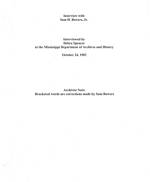Oral histories : interviews with Sam H. Bowers, Jr.

Oral history interviews conducted in 1983 and 1984 with Sam Bowers, Mississippi-based segregationist.
More About This Collection
Creator
Bowers, Samuel Holloway, 1924-2006
Contributor to Resource
Spencer, Debra
Publisher
Interview with Sam Bowers, Mississippi Department of Archives and History, Jackson, Mississippi
Date of Original
1983/1984
Subject
Men, White--Mississippi
White supremacy movements--Mississippi
Ku Klux Klan (1915- )
Mississippi--Race relations
Mississippi--Politics and government
Segregationists--Mississippi
Murderers--Mississippi
Hate crimes--Mississippi
Trials (Hate crimes)--Mississippi
Trials (Murder)--Mississippi
Oral history--Mississippi
Bowers family
Gulf and Ship Island Railroad
United States. Navy
United States. Federal Bureau of Investigation
Korean War, 1950-1953
World War, 1939-1945
Fascism
Communism
Ku Klux Klan (1915- )--Mississippi
Civil rights--Mississippi
Bowers, Samuel Holloway, 1924-2006--Trials, litigation, etc.
Dahmer, Vernon Ferdinand, 1908-1966--Assassination
People
Bowers, Samuel Holloway, 1924-2006
Dahmer, Vernon Ferdinand, 1908-1966
Barnett, Ross R. (Ross Robert), 1898-1987
Till, Emmett, 1941-1955
Parker, Mack Charles
Location
United States, Mississippi, Forrest County, 31.18887, -89.25786
United States, Mississippi, Forrest County, Hattiesburg, 31.32712, -89.29034
United States, Mississippi, Neshoba County, 32.7535, -89.11757
United States, Mississippi, Neshoba County, Philadelphia, 32.77152, -89.11673
Medium
oral histories (literary works)
transcripts
Type
Text
Description
Sam H. Bowers, Jr., was convicted in 1998 for his role in the 1966 firebombing death of Mississippi civil rights activist Vernon Dahmer. Bowers died November 6, 2006, in the Mississippi State Penitentiary at Parchman. The Mississippi Department of Archives and History conducted three interviews with Bowers, on October 24, 1983, at MDAH; on January 30, 1984, in Florence, Mississippi; and on November 5, 1984, at MDAH. Select from the links below to listen to audio recordings of the interviews, view transcripts, and view a handwritten manuscript submitted by Bowers on December 9, 1984, in which he clarifies his answer to the "Philosopher-King" question in an earlier interview. Neither the audio recordings nor the transcripts offer a complete version of the interviews. Sentences missing from the recordings appear in the transcripts, and a few segments of audio were omitted from the transcripts. The transcripts also reflect changes requested by Bowers, such as the consistent substitution of "rebel" for "Bolshevik."
Contents: Interview 1, Sam Bowers -- Early background -- grandfather E. J. Bowers, Jr. -- Confederate Conspiracy -- great-grandfather, E. J. Bowers, Sr. -- Confederate Officers' Corps -- "Marrying Up" -- G.&S.I. Railroad at Gulfport -- Political beginnings of E. J. Bowers -- Bowers' family history -- Relationship between Evangeline Bowers and E. J. Bowers -- Early education -- Bill Thompson -- World War II -- Post-War activities -- Interview 2, Sam Bowers -- Influence of the Navy -- Bowers' definition of "Fascist" -- Two most important lessons from the Navy -- Motivation for giving these interviews -- Post-World War II -- McCarthy, Korea, Social and Political Life in Mississippi -- Race and the military -- Lynch mobs -- Emmett Till -- Brown vs. Board of Education decision -- The Four Quadrants of Mississippi Politics -- J. P. Coleman -- Support of Ross Barnett -- Organizational affiliation -- Trials and convictions -- Being interviewed by the FBI -- "Criminal Lunacy" -- Arrests in Philadelphia -- Dahmer cases -- Interview 3, Sam Bowers -- Prejudices of state officials in the Dahmer Case -- Bowers' lawyers' strategies -- Committee on Un-American Activities -- Judging political figures -- White Knights of the Ku Klux Klan and other organizations -- Segregation -- Communism and States' Rights -- Definition of Babylonian Central Bankers -- FBI's accusation of Bowers as Pro-Communist -- Citizens' Council -- Experiences in the Federal Penitentiary -- Experiences in the Forrest County Jail -- Sovereignty Commission -- Hypothesis of what happened in Philadelphia -- Bowers' view of Social, Economic, and Political Policies.
The Civil Rights Digital Library received support from a National Leadership Grant for Libraries awarded to the University of Georgia by the Institute of Museum and Library Services for the aggregation and enhancement of partner metadata.
Contributing Institution
Mississippi. Department of Archives and History

